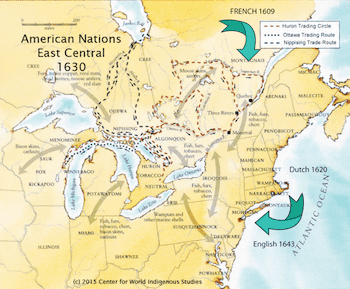


Nations Diplomacy in Wyandot,
Anishinabek, Haudenosaunee, and Lenape
1630-1779 and Contemporary patterns of
Nation and State Diplomacy Fourth World
Nations are rapidly being pulled into
international engagements while developing
their political and strategic interests in
relation to settler states.
What can be learned from 150 years of
diplomatic relations between the Wyandot,
Anishinabe, Haudenosaunee and Lenape
nations and between these nations and
invading Kingdoms from Europe in the 17th
and 18th centuries that may inform
contemporary diplomatic relations between
nations and states?
This is a study about diplomacy between the
Fourth World nations and those nations
engaged with the French, Dutch, English,
Pennsylvanians, New York Colony, Virginians
during a series of wars between European
Kingdoms from 1630 to 1779. This study
consists of an inquiry into the diplomatic
devices of these four nations as they apply
the concepts and rituals of diplomacy long
practiced before the invasions by the
Swedes, Dutch, English and French into the
regions of what became known as Virginia,
New Jersey, New York, Ontario and
Pennsylvania. The study furthermore
concentrates on how these diplomatic
practices initially adopted by the outsiders
seeking beaver firs, land, economic and
political advantages. It is expected the study
will see modifications of these practices over
time. The study pays particular attention to
gifting between nations and between
nations and colonial and monarchic
representatives as part of the ceremonial
practice including foods, items and objects
were shared between nations, between
nations and colonial/monarchic
representatives?
The study will test the efficacy of the three
principles in the Great Law that serve as the
foundation for relations between
peoples: “Based in the Great Law the
Haudenosaunee, Abenaki, Lenape, Shawnee,
Wyandot and Anishinabek among many
other nations observed three basic
principles of diplomacy:
Gáiwoh (righteousness), Skénon (health),
and Gashasdénshaa(power). These are
applied in direct dialogue and negotiations.
The first principle of Gáiwoh when practiced
properly requires that human beings in
society and between nations be just and
their relations must be balanced and just.
The second principle of Skénon requires a
soundness of mind and body and the
establishment of peace (becoming one
heart, one heart, one body and becoming
one people).
Finally, the third principle of Gashasdénshaa
affirms the centrality of law and custom
backed by such force as is found to be
necessary to ensure that Gáiwoh prevails.
This is the highest and most practical form
of diplomacy and means to bring about
political equality.”
The Study is conducted within the Fourth
World Theoretical Framework that prescribes
political equality between nations, Kingdoms
and states. The study tests this the central
concepts of this framework.
Principal Investigator: Rudolph C. Ryser
Research Associates: Heidi Bruce and Dina
Gilo-Whitaker
Research Intern: Gerald Meitz
The library is dedicated to the memory of Secwepemc Chief George Manuel (1921-1989), to the nations of the Fourth World and to the elders and generations to come.
access here